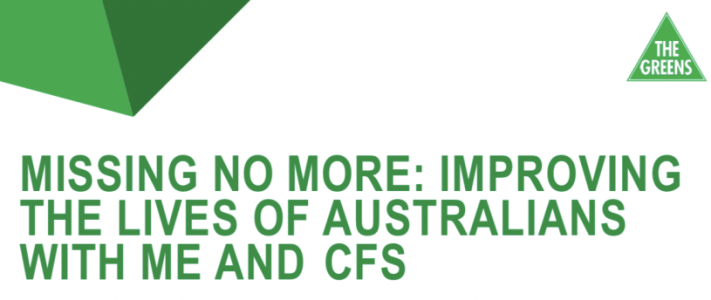Senator Jordon Steele-John has announced the Australian Greens’ policy on Myalgic Encephalomyelitis (ME) and Chronic Fatigue Syndrome (CFS), planning to commit $15 million to biomedical research, a national summit, better access to the National Disability Insurance Scheme (NDIS) and money for advocacy organisations.
This policy is welcomed by the ME and CFS community in Australia. The Australian Greens have shown a real interest in helping people with ME and CFS, including a speech by Adam Bandt MP, petitioning parliament on the NDIS, pursuing medical research funding and support for a number of years at the senate estimates hearings and support by the Australian Greens at Millions Missing events.
The Greens have nine senators and one member of the House of Representatives elected to federal parliament.
$15 million for biomedical research
The Greens have listened to advice from Australian scientists and committed $15 million to biomedical research. Their decision recognises Australian scientists are doing world leading research and are poised to expand their biomedical research to improve diagnosis and, over time, treatment. Meaningful investment in biomedical research sends a powerful message to patients and their families that they matter and would provide hope for the future.
National Summit
The idea of a National Summit co-designed with patient advocates provides a way forward that would avoid mistakes of the past. A summit like this could also help improve access for patients to needed support and it could help set-up a process that ensures any new guidelines are based on evidence. The key criticism by the Australian Senate of the 2002 guidelines was they were not evidence-based and they ignored patients’ input.
Better access to the NDIS
It is devastating that, despite the suffering people are experiencing, they are largely unable to access needed NDIS support. While improved clinical guidelines will help address this, the action proposed to improve access for patients to access the NDIS (established a dedicated pathway for people with ME and CFS) is welcomed.
Money for advocacy
The Greens’ proposal focuses on funding organisations to educate healthcare providers to improve the treatment provided to people with ME and CFS. Any action that helps remove graded exercise treatment (GET) and cognitive behaviour therapy (CBT) as pathways to try and cure people with ME or CFS is welcome and actions like this will reduce harm.
Greens’ history of supporting people with ME and CFS
The Greens have long been supporters of people with ME and CFS, in 2015 Senator Scott Ludlam said “I am struggling to think of a cohort of people in our community that large for whom there is so little,” and asked the National Health and Medical Research Council (NHMRC) what type of research they were funding.
In 2017, Ludlam asked the NHMRC how they could stop harmful graded exercise and cognitive behavioural therapy being forced by GPs.
“At the moment there is obviously a range of views in the GP community about whether this is psychosocial or rather than biomedical. What is the process for funding education programs for GPs and distributing this research that’s been done so that we can winnow out some of the frankly quite harmful treatments that have been proposed?” asked Ludlam.
Ludlam (now replaced by Senator Steele-John in parliament) wrote for The Guardian last year, ‘To the #MillionsMissing with ME/CFS, something remarkable is happening’.
More recently, Senator Steele-John raised concerns about the make-up of the committee the NHMRC appointed to advise government.
“Could I just ask you whether you would agree that it would be concerning if a member of the panel thought that ME or CFS patients could be cured by doing things like aqua aerobics?” asked Senator Steele-John in June last year, talking about committee member Assoc Prof Broadbent’s five-week aqua aerobics trial.
Last year Senator Steele-John established the Parliamentary Friends of Myalgic Encephalomyelitis and chronic fatigue syndrome, co-chaired by him, a Labor senator and Liberal Senator.
“For too long people who journey with ME or CFS have been ignored, belittled and written-off by society and their government. I am thrilled to have established this Parliamentary Friendship Group because in it there now exists a forum in which the voice of the community can be heard and can provide parliament with guidance as to how it might, as an assembly of your representatives, best fulfil those responsibilities to you that it has thus far so shamefully neglected,” said Senator Steele-John.
Here is the policy.






 ) and a message about #MillionsMissing with your own networks. Desktop: Download by right clicking on the image or clicking on the download icon in the bottom right corner of the image. Mobile:
) and a message about #MillionsMissing with your own networks. Desktop: Download by right clicking on the image or clicking on the download icon in the bottom right corner of the image. Mobile: